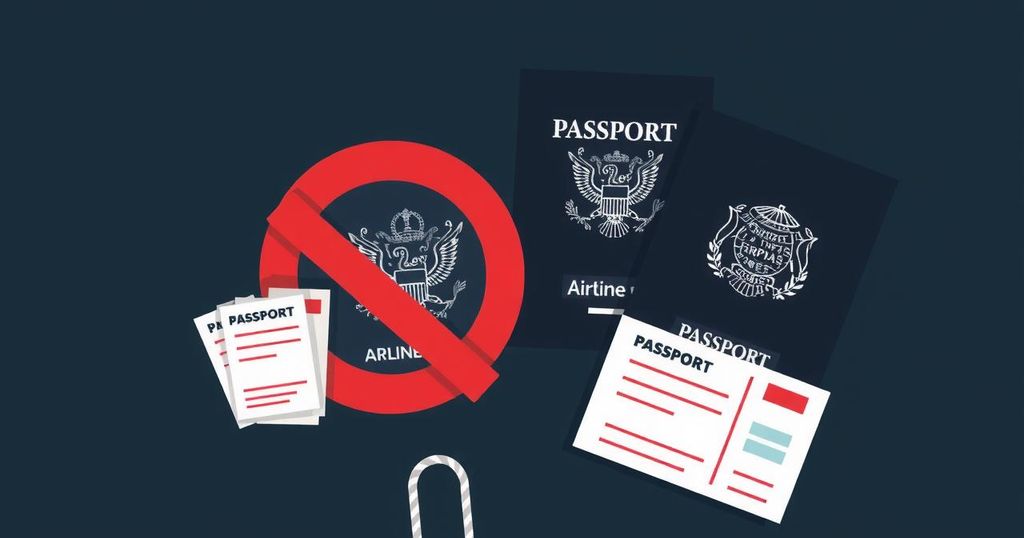Trump Announces Travel Ban on Haiti, Cuba, and Venezuela Amid Immigration Crackdown
President Trump announced a complete travel ban on Haitian nationals and partial restrictions for Cubans and Venezuelans starting June 9. This move is part of a broader immigration crackdown aimed at limiting entry from countries deemed as security threats. The decision has drawn criticism from community leaders and human rights advocates, highlighting concerns over racism and the policy’s humanitarian impact.
In a significant announcement on Wednesday, President Donald Trump proclaimed a full travel ban on Haitian nationals seeking entry into the United States, alongside partial restrictions for nationals from Cuba and Venezuela. This decision is part of a broader crackdown on legal immigration as the travel ban takes effect on June 9.
The White House indicated that the measure “fully restricts and limits the entry” of Haitians while only partially restricting Cubans and Venezuelans. Consequently, most immigration and non-immigration visas from these countries will be suspended, affecting various visa categories like B-1, B-2, F, M, and J. However, the ban does not impact individuals already holding valid visas.
This latest policy continues the federal government’s efforts to limit immigration from these nations, a focus Trump has had since he took office. Early on, he instructed his administration to investigate the screening processes of countries deemed insufficient, which led to these restrictions.
The ban is not isolated to just these three countries; it also encompasses several others like Afghanistan, Libya, and Iran among others. The proclamation specifically affects nationals from designated countries who are outside the U.S. and lack a valid visa as of the effective date. Notably, exceptions apply to green card holders and certain immediate relatives of U.S. citizens.
Trump justified the action by asserting it is essential for national security, stating that the affected nations lack appropriate vetting measures for travelers. Additionally, he criticized Cuba as a state sponsor of terrorism, arguing that its government does not cooperate adequately regarding the return of its nationals.
During a conference in Boston addressing the situation in Haiti, attendees, such as Brian Concannon of the Institute for Justice and Democracy, reacted with disapproval, labeling the specific targeting of Haiti as racially motivated.
The implications of this new ban are serious, particularly for Haitians who rely on the ability to travel between the U.S. and Haiti for family and business connections. Pierre Imbert, a community leader in Miami, remarked that limiting access will deeply affect families, emphasizing that many depend on these ties for support.
Moreover, Trump mentioned in the proclamation that in 90 days and subsequently every six months, key officials must evaluate whether to extend or lift any of these suspensions clamping down on immigration. However, previous efforts to overturn Temporary Protected Status for Haitians under a different administration remain a pressing concern.
Adelys Ferro, an executive leader of the Venezuelan American Caucus based in South Florida, condemned the travel ban, asserting it reflects blatant racism and discrimination. She pointed out the commonality among affected nations, all grappling with crises such as war and dictatorship.
International human rights organizations have also criticized Trump’s actions, regarding the restrictions as divisive and harmful to vulnerable populations. Robyn Barnard from Human Rights First cautioned that such measures not only undermine national security but also endanger those seeking refuge in the U.S.
This ban follows a continual trend as Trump’s administration had previously attempted similar actions, raising questions about the long-term humanitarian impact and the legalities of such broad prohibitions on immigration from specific nations.
In summary, President Trump’s recent proclamation enacts a full travel ban on Haitians while partially limiting entry for Cubans and Venezuelans. This is part of his ongoing commitment to reduce immigration from nations perceived as security risks. The move has drawn widespread criticism, both for its humanitarian implications and allegations of racial discrimination. As the situation develops, its broader impact on U.S. immigration policy and relations with these countries remains to be seen.
Original Source: www.yahoo.com




Post Comment